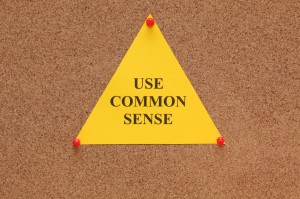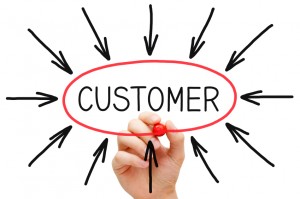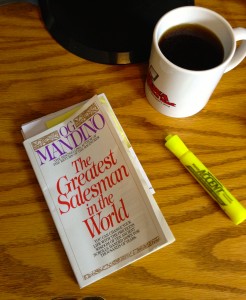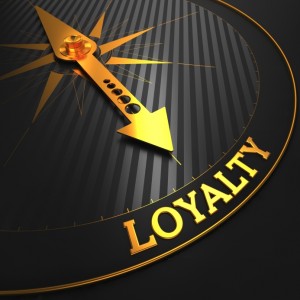Retired!
Common Sense Isn’t Common Practice
Common sense and common practice much like knowing and doing are not the same.
I know it’s obvious but knowing how to sell and putting that knowledge into practice (doing) continues to be a challenge for many sales professionals.
As sales professionals we have a tendency to make the sales process over complicated.
We work hard learning advanced techniques to catch our customer’s attention.
We spend hours making sure our presentations will dazzle our customers.
Sometimes we even resort to trickery and manipulation to get the sale. (This makes no sense please don’t do it!)
Yet, with all this done we don’t get the order!
Why?
“More often than not, when we fail to get the business (order) it’s because we failed to put common sense into common practice.”
Common sense tells us that:
- We need to connect with our customers.
- We should talk about things our customers want to talk about not what we want to talk about.
- We shouldn’t waste our customers time by not being prepared.
- We should be very knowledgable and focused on the products and services we sell.
- We must consistently provide value to our customers.
If this is common sense, why can’t we make it common practice?
Our customers do business with companies and sales professionals they Know, Like and Trust.
This just makes common sense.
I truly believe to be successful in sales its no harder than to put common sense into common practice.
If we listen to what our customers are asking and how they want us to engage them, we then need to put common sense into common practice.
Once we have this knowledge (information) from our customers it’s time to get to the doing.
- Follow your customer’s lead.
- Look for solutions to their problems and concerns.
- Begin implementing the sales skills and processes we’ve been trained to do.
- Provide value with each and every conversation and sales call.
- Engage with them the way they want to be engaged.
Sales success is not complicated it’s just common sense put into common practice!
Thank you for taking the time to read this article.
If you would like, please leave a comment below or you can email me at feedback@wewaonthenet.com.
You can also follow me on Twitter at www.twitter.com/WE_Ward where I tweet articles I come across that I think may be of interest.
If you would like to have future post’s automatically sent to you via email, please sign up below or in the “sign up and connect” section on my website.
You can unsubscribe at anytime.
P.S. – If you have been reading my blog for a while and feel it would be of value to your friends, co-workers or other salespeople you know, I would appreciate your recommendation. Your referral would be greatly appreciated.
Now let’s get out there and put common sense into common practice!
Are You a Winner or Whiner?
Again, I’m flying back to Texas from North Dakota writing this week’s post. (I can’t think of a better way of passing time while on a plane.)
A little about last week’s post.
With the exception of being accused of promoting cruelty to frogs (which I vehemently deny), last week’s post “The Water’s Great Hop In!” seemed to strike an accord with some.
However, I think I mistakenly left the impression that everything we’ve done as sales professionals in the past is now wrong and to be successful we must change everything we know and do.
Nothing is further from the truth.
I think change may be as simple as the frog hopping out of the pan before the water starts to boil (last week’s example) or taking a close look at ourselves.
Realizing change is needed and being willing to make the necessary changes may be all it takes to make a difference in our sales career.
But before you can start to change you must take a hard look at yourself.
You need to ask yourself:
“Are you a whiner or winner?”
Two Types of Salespeople
In my view there are two types of salespeople:
The whiners and the winners.
The whiners aren’t very good at selling. They spend lots of time feeling sorry for themselves and looking for something or someone else to blame.
Contrast this with the winners, who have no time for bitching and complaining. They’re too busy selling and making money.
I know this is a strong statement but after years in business and sales I believe it’s that simple.
If you are a winner, you’ve probably adapted to the changing sales environment (hopped out of the water early on) and are enjoying sales success.
If you are a whiner, I suspect the water keeps getting hotter, what you’re doing is not working and you are not seeing the success you think you deserve.
I don’t know how to say it any nicer:
“Quit whining, take responsibility for your own results and jump out of the pan of boiling water.”
Conclusion
Be a winner not a whiner.
Do it today!
Do it right now!
Thank you for taking the time to read this article.
If you would like, please leave a comment below or you can email me at feedback@wewaonthenet.com.
You can also follow me on Twitter at www.twitter.com/WE_Ward where I tweet articles I come across that I think may be of interest.
If you would like to have future post’s automatically sent to you via email, please sign up below or in the “sign up and connect” section on my website.
You can unsubscribe at anytime.
P.S. – If you have been reading my blog for a while and feel it would be of value to your friends, co-workers or other salespeople you know, I would appreciate your recommendation. Your referral would be greatly appreciated.
Now let’s get out there and over-deliver!
The Water’s Great Hop In!
I’ve heard you can drop a frog into boiling water and the frog will quickly jump out but if you put a frog in water and slowly increase the temperature the frog will remain in the water even after the water begins to boil. Slowly killing the frog. (Please don’t try this experiment at home!)
remain in the water even after the water begins to boil. Slowly killing the frog. (Please don’t try this experiment at home!)
So, what does this have to do with Sales and Salespeople?
Much like the frog being put into hot water, if a person is thrown or jumps into sales without the desire to be a sales professional or they realize sales is not for them they will either quit (jump out) or ask to transfer (hop out) to another position.
Most of us will not stay where we are not comfortable or fear survival. Usually, never getting back in sales (the water) again.
But, in most cases, we are in sales because we demonstrated the ability or potential ability to sell early in our sales career. We may have been uncertain and a little scared if we could make a living in sales. However, we were most likely excited and comfortable with our decision. Much like a frog being put in room temperature water.
We probably thought “this water ain’t bad”. (Can you tell I’m from Texas?)
Over the next few years, our skills naturally got better, our income continued to increase, life was good. But, if we were not watchful things slowly began to change. Just like the water temperature slowly increasing and the frog being unaware of the change.
Things are always changing:
- New and better products introduced into the market.
- Innovation happening so quickly we can hardly keep up.
- Strategies that worked in the past aren’t working anymore.
We may begin saying to ourselves “I’m working harder than ever but I seem to be getting nowhere.”
I suspect the frog realizes something isn’t right as the water gets hotter but doesn’t know the reason. “The water was great when I hopped in!”
Is the temperature of the water changing around you?
Let’s not kid ourselves, it doesn’t matter if you are just starting out in sales or a seasoned sales professional change is happening at a quicker pace than ever before.
If you are selling or doing things the same way you did 10 years ago, 1 year ago or even last week you may be falling behind.
Over the next few weeks I plan to dive more deeply into the topic “What can I do to keep from finding myself in boiling water?“
I would like your thoughts.
If you are having struggles growing or keeping your sales up, aware something has changed in your effectiveness as a sales professional and not quite sure what, or would like me to address a particular topic please drop me an email or leave a comment below.
I will try to share your concerns and provide helpful information as we discuss the ever changing sales environment.
Thank you for taking the time to read this article.
If you would like, please leave a comment below or you can email me at feedback@wewaonthenet.com.
You can also follow me on Twitter at www.twitter.com/WE_Ward where I tweet articles I come across that I think may be of interest.
If you would like to have future post’s automatically sent to you via email, please sign up below or in the “sign up and connect” section on my website.
You can unsubscribe at anytime.
P.S. – If you have been reading my blog for a while and feel it would be of value to your friends, co-workers or other salespeople you know, I would appreciate your recommendation. Your referral would be greatly appreciated.
Now let’s get out there and over-deliver!
No More Customers?
What would you and your company do if you found out that the customers you currently have will be your last.
No more new customers!
Would you treat them differently?
Our Most Important Generation
Back in March, Seth Godin published a post “No More Kids?”
He posed the question “What in some sort of sci-fi solar flare cataclysm, it was impossible for humans to have more kids?”
“No more babies.”
What a horrible thought!
His point was, would we treat our last generation, “our youngest students” differently if we knew they were the last.
Would we do everything we could do to make sure we did things right for this last generation?
Would we make sure to be there for them in times of need?
Would we see they were provided every opportunity to be the best?
I believe we would.
I think we would name this last generation the “Most Important” generation instead of calling them X, Y or Z generation.
Our Most Important Customers
Seth went on to ask, what if you knew you would never have a new customer?
What if you were faced with no chance of new prospects, competitors aggressively soliciting your customers (probably the case already), and your company and your family’s future resting solely on your current customers?
Would you treat your customers differently?
If you intend to remain in business I suspect you would begin to do things much differently.
Talk about being focused!
I can only imagine.
Would you dare make another unprepared sales call?
- Not if your life depended on it!
How about customer service?
- Service Excellence would replace Customer Service.
What about on-time deliveries?
- Never late – never sorry!
What about inventory and inventory turns?
- Would turns really matter?
Conclusion
Would you not focus completely on building trust, providing value and growing strong relationships that would last under any circumstance?
I guess what I’m trying to ask “What would be the “importance” of you last customers?“
Maybe said better, “Are you currently providing them the same service and value you would if they were your last?”
Seth Godin ended his post with this sentence:
“What happens when we treat children and customers like maybe, just maybe, they’re the last chance we get to get it right.”
Please leave a comment below or email me and let me know:
What would you change or do differently if you knew your current customers may be your last?
Thank you for taking the time to read this article.
If you would like, please leave a comment below or you can email me at feedback@wewaonthenet.com.
If you would like to have future post’s automatically sent to you via email, please sign up below or in the “sign up and connect” section on my website.
You can unsubscribe at anytime.
P.S. – If you have been reading my blog for a while and feel it would be of value to your friends, co-workers or other salespeople you know, I would appreciate your recommendation. Your referral would be greatly appreciated.
Now let’s get out there and over-deliver!
Book Chat: The Greatest Salesman in the World
“Often I’ve heard you say that no other trade or profession has more opportunity for one to rise from poverty to great wealth than that of a salesman.” Og Mandino
Mandino
I’m rereading “The Greatest Salesman in the World ” by Og Mandino as I fly back home from North Dakota.
This is my third, fourth or fifth time to read or reread this book as evidenced by the worn and dog-eared pages along with highlighted sentences and notes scribbled throughout the book.
It’s a quick read being only 111 pages but is packed full of sound advice and 10 principles if learned and followed will make a huge difference in your sales career.
All of this is woven around the story of a young camel boy who learns the secrets to sales success by following just 10 simple principles and becomes known as the greatest salesman in the world.
Over the past year I’ve been trying to follow the lessons in the book. (It hasn’t been that hard)
Without a doubt, this book has made a drastic difference in my approach to sales and sales management.
I should also say it has change the way I approach many things in my life.
None of the principles are anything I didn’t already know. Heck, most are common sense and already practiced. However, Mr. Mandino presents these principles in a way that leaves readers (me) feeling inspired and thinking “now I understand what it takes to be a great salesman”.
Many of the posts I’ve written over the past year,especially “The Rainmaker Series” of posts, were inspired by this book. In these series of articles I discussed:
- Know, Like and Trust
- Persistence
- Emotions
- Replacing bad habits with good habits
I also have begun recommending and coaching the teachings from this book. (I wish I had known about this book sooner.)
Conclusion
I highly recommend “The Greatest Salesman in the World” and would consider it required reading for anyone who aspires to be the best.
My favorite quote from the book:
“Failure will never overtake me if my determination to succeed is strong enough.”
Thank you for taking the time to read this article.
If you would like, please leave a comment below or you can email me at feedback@wewaonthenet.com.
You can also follow me on Twitter at www.twitter.com/WE_Ward where I tweet articles I come across that I think may be of interest.
If you would like to have future post’s automatically sent to you via email, please sign up below or in the “sign up and connect” section on my website.
You can unsubscribe at anytime.
P.S. – If you have been reading my blog for a while and feel it would be of value to your friends, co-workers or other salespeople you know, I would appreciate your recommendation. Your referral would be greatly appreciated.
Now let’s get out there and over-deliver!
To Be Perfectly Honest With You
If you find yourself using the phrase “to be perfectly honest with you” in your sales presentations or in normal conversations with your customers you need to think about what you’re saying.
This week we had a manufacture’s representative introduce his new products to our sales team and a few of our customers. We catered lunch, had a decent crowd (hint: if you provide food people will show up) and was looking forward to learn something new.
Instead, what I heard was a repetition of “to be perfectly honest with you” each time he tried to emphasize something important he was going to say or make something he was about to say more believable.
“To be perfectly honest with you …”
This was like someone scratching a chalkboard with their fingernails. Every time I heard this phrase, I cringed and hoped others (especially our customers) weren’t feeling the same way.
I began to wonder, if what he said before saying “to be perfectly honest with you” wasn’t honest and now what he’s saying is or did he feel he had to preface his upcoming statement with “to be perfectly honest” before he felt comfortable being less than honest?
I hope neither statement is true.
Most likely, this is just one of those annoying words or filler phrases that creep into our presentations that are not needed, such as:
- “right”
- “uhh”
- “you know”
I’m pretty sure there was no intent of dishonesty but it did leave me questioning his choice of words.
I really couldn’t tell you much about the new products he was showing but I think the food was pretty good.
I do know for me, the presentation was sidetracked by a simple phrase.
Conclusion
So, what do you think when someone begins a statement with “To be perfectly honest with you?”
Does this make you wonder about the truthfulness of what they are saying or is it just the sales coach in me being overly critical?
Please email me your thoughts. I’d love to hear from you.
If you find yourself needing to start a sentence with “To be perfectly honest with you …” you probably want to consider or reconsider your words more carefully!
Thank you for taking the time to read this article.
If you would like, please leave a comment below or you can email me at feedback@wewaonthenet.com.
You can also follow me on Twitter at www.twitter.com/WE_Ward where I tweet articles I come across that I think may be of interest.
If you would like to have future post’s automatically sent to you via email, please sign up below or in the “sign up and connect” section on my website.
You can unsubscribe at anytime.
P.S. – If you have been reading my blog for a while and feel it would be of value to your friends, co-workers or other salespeople you know, I would appreciate your recommendation. Your referral would be greatly appreciated.
Now let’s get out there and over-deliver!
More About Them and Less About You (80/20 Rule)
It’s Monday morning and you just had a great weekend. You get back to work and someone asks about your weekend. You no more begin to tell how much fun you had when they jump right into their exciting or not so exciting past couple of days. You sit there and listen “never once” getting a chance to answer the original question or much less being able to talk about your weekend.
or
You ask a friend out for lunch and all they do is talk about their life. “Never once” considering why you asked them out to lunch or caring about what’s happening in you life. While the conversation may be pleasant, do you wonder if they really care about you?
or
You come home from work, sit down at dinner and afterword realize you only talked about your day. “Never once” thinking about anyone else’s day at the table.
How do you feel?
Pareto Principle (80/20 rule)
Maybe you’ve heard of the Pareto Principle or often referred to as the 80/20 rule. It states that roughly 80% of the effects come from 20% of the causes. Or as Pareto observed that 80% of the peas came from 20% of the pea pods but I digress.
causes. Or as Pareto observed that 80% of the peas came from 20% of the pea pods but I digress.
In Business and Sales it is widely accepted that:
- 80% of a company’s profits come from 20% of its customers
- 80% of a company’s complaints come from 20% of its customers
- 80% of a company’s sales come from 20% of its products
- 80% of a company’s sales are made by 20% of its salespeople
But you may ask “What does this have to do with talking about my weekend or lunch with a friend?”
Maybe nothing but:
What if your friends used the 80/20 rule and spent 80% of the time asking and talking about what you want to talk about and 20% about themselves and what they want to discuss.
How would you feel?
I’m sure you would walk away from this discussion or lunch feeling completely different.
You would most likely want to include them more in your conversations and invite them to lunch more often because they have demonstrated they care about you and what you have to say.
By simply making the conversation less about them and more about you, your perspective about them completely changes. Agreed?
As Salespeople we often make the same mistakes as our friends.
In our efforts to get our customers to like us and buy our products and services, we want to tell them how good we are, how great our company is and all the ways we can help them. “Never once” thinking about what our customers want to discuss.
How do they feel?
We fail to ask the questions that allow them to say what they want to say and forget to listen to what they do say.
We may ask our customer a question about themselves or their business but in our haste and excitement to make a sale or promote ourselves we quickly jump into talking about what we are there to discuss.
“We end up talking mostly about us and little about them.”
This must change.
What would happen if you implemented the 80/20 rule in your next sales call? Making sure that 80% of the conversation is about them and their company. Listening for their wants and needs. Helping them find solutions to their problems. Then making sure only 20% of your time is talking about you and your company.
Do you think your customers would walk away from this sales call feeling completely different?
Would you begin separating yourself from your competitors?
If you customers know you care about them and recognize you are not just there to make a sale, would they be more comfortable including you in their discussions and valuing what you have to say?
Then, when the time is right, they will be buying the products and services you have to offer. I strongly believe this will be the case.
Conclusion
- It will not be easy to implement the 80/20 rule with your customers.
- It will require to be prepared for each and every sales call.
- Be intentional and engaged with the customer, resisting the urge to mostly talk about yourself and your company.
- Making sure your customer knows you care before asking for the order or diving into your well crafted sales pitch.
- Remembering 80% them, 20% me.
I think it really boils down to intentionally giving (spending) most of your time making sure your customers and friends know you care about them and less of your time talking about yourself or asking for something in return.
Thank you for taking the time to read this article.
If you would like, please leave a comment below or you can email me at feedback@wewaonthenet.com.
You can also follow me on Twitter at www.twitter.com/WE_Ward where I tweet articles I come across that I think may be of interest.
If you would like to have future post’s automatically sent to you via email, please sign up below or in the “sign up and connect” section on my website.
You can unsubscribe at anytime.
P.S. – If you have been reading my blog for a while and feel it would be of value to your friends, co-workers or other salespeople you know, I would appreciate your recommendation. Your referral would be greatly appreciated.
Now let’s get out there and over-deliver!
Book Chat: Essentialism: The Disciplined Pursuit of Less
From the book “Essentialism”:
- Have you ever found yourself stretched to thin?
- Overworked and underutilized?
- Busy but not productive?
- Always in motion but getting nowhere?
If you answered yes to any of these questions, the new book by Greg McKeown called “Essentialism: The Disciplined Pursuit of Less” is a must read.
Essentialism is the discipline to distinguish between what the Author calls the “trivial many” and focus on the “vital few” things that truly make a difference. It’s the relentless pursuit of “Less but Better.”
This book really hit home with me as I seem to always be stretched to thin. I take on too many projects, underestimate the time it will take to complete many of these tasks and let work creep into much of my cherished personal time.
Essentialism not only exposes many of my struggles with time (or lack of time) but also lays out a mindset to begin eliminating the non-essential and focusing on what is essential.
I know I cannot do this book justice with a summary review. There are just too many gems scattered throughout the book. So, here or a few of the things I highlighted.
* Essentialism is not about how to get more things done; it’s about getting the right things done.
* If you don’t prioritize your life, someone else will.
* I can do anything but not everything.
* If you could be truly excellent at only on thing what would it be?
* The Johnson & Johnson example: Customers are first, shareholders are last.
* The Closet Story – You will never look at your closet the same.
This is just a few of the highlights. In fact, I can’t remember a book that I have highlighted so many lines and dog-eared so many pages.
Essentialism is not a how-to book but does teach a method to be more efficient, productive and effective in a systematic way.
This book most certainly will be one of the more important books written this year and possibly a game changer in the way we choose the best use of our time.
I strongly recommend you read this book if you or anyone you know struggles with lack of time.
But if you’re still not persuaded enough to shell out $15 for the hard copy or $9.99 for the Kindle Edition, the author will share the 1st chapter of the book if you subscribe to his email list. Simply go to www.gregmckeown.com and subscribe.
I can tell you I read the 1st chapter a couple of times before reading the rest of the book. The 1st chapter is that good!
If you don’t start choosing what you want to do, someone else will!
Thank you for taking the time to read this article.
If you would like, please leave a comment below or you can email me at feedback@wewaonthenet.com.
You can also follow me on Twitter at www.twitter.com/WE_Ward where I tweet articles I come across that I think may be of interest.
If you would like to have future post’s automatically sent to you via email, please sign up below or in the “sign up and connect” section on my website.
You can unsubscribe at anytime.
P.S. – If you have been reading my blog for a while and feel it would be of value to your friends, co-workers or other salespeople you know, I would appreciate your recommendation. Your referral would be greatly appreciated.
Now let’s get out there and over-deliver!
Loyal vs Satisfied Customers – What’s the Difference
Loyal customers are much different from satisfied customers. 
Do you know the difference?
I didn’t but I think I do now.
During a training session this week we explored the differences between the two.
Derek Roberts, our sales coach for this week’s training described the difference this way:
“A satisfied customer says I received value (I’m satisfied) whereas a loyal customer says I received value and I am valued (I’m a loyal customer).”
Can you see the difference?
A satisfied customer believes they pay a fair price and receive value for the goods and services they receive.
A loyal customer believes the same as a satisfied customer but also believe (know) we value them as much as a customer as they value us.
Transactional vs. Relational
A satisfied customer is more transactional (an exchange of goods and services for money) whereas the loyal customer is much more a relational transaction. They want to be valued as much if not more than the value they receive.
How many companies consider you a loyal customer?
Derek, gave this example:
He has been a long time customer of his Internet Provider. They mostly meet his demanding needs which the other providers in the area can’t. He is subscribed to their premium package and doesn’t require much attention from them. However, when he does have a problem they seem to always mess up. They get the billing wrong, make him wait for what seems like hours to talk to someone. You get the idea. So, Derick is at best satisfied but also feels almost like a hostage.
But he suspects the Internet Provider considers him a loyal customer. He has had a long relationship with the provider. He is signed up for the best packages they have to offer. They don’t hear many, if any complaints therefore he must be loyal.
Derek is far from being a loyal customer. I don’t think he would even consider himself a satisfied customer. He goes all over the country telling this story about how unsatisfied he is with his internet provider, yet I think he is probably on their list as a loyal customer.
A loyal customer will stand up and sing your praises to all that will listen. They are willing to put their reputation on the line for you and your company. They will refer you to their friends, family and anyone they feel you could provide a value. It’s more than a fair price. To a loyal customer it’s about the relationship between you and them.
Satisfied vs. Loyal Employee
Another good example that I think we can all relate to is a satisfied employee vs. a loyal employee.
A satisfied employee feels they receive value for the work they perform. (fair pay, benefits and working conditions)
A loyal employee also feels satisfied (transactional) plus they know they are also valued (relational).
The benefits provided by both loyal employees and loyal customers are much the same. Both customer and employee loyalty is one of the most important factors in any successful company.
Loyalty vs. Longevity
We must not confuse longevity for loyalty as I think Derek’s internet provider probably does. I don’t believe time has anything to do with loyalty. I think it’s a common mistake made by many of us. We mistake years of being a customer as a measure of loyalty.
Nor can we believe we can have a loyal customer without them being a satisfied customer first. Without first providing value (I’m satisfied) it will be next to impossible to build the relationship a loyal customer expects.
Conclusion
Will you begin thinking of what makes you a loyal customer and let me know?
I would also like you to start thinking what you need to do to convert your satisfied customers into loyal customers?
If you are blessed with many “truly” loyal customers do your very best to never let them become just satisfied!
The road to having loyal customers begins with satisfied customers first. Once they find value in what we have to offer we must continue gaining their trust and making sure they know how much we value them.
Thank you for taking the time to read this article.
P.S. – If you have been reading my blog for a while and feel it would be of value to your friends, co-workers or other salespeople you know, I would appreciate your recommendation. Your referral would be greatly appreciated.
If you would like, please leave a comment below or you can email me at feedback@wewaonthenet.com.
You can also follow me on Twitter at www.twitter.com/WE_Ward where I tweet articles I come across that I think may be of interest.
If you would like to have future post’s automatically sent to you via email, please sign up below or in the “sign up and connect” section on my website.
You can unsubscribe at anytime.
A little something extra:
Customer loyalty doesn’t have to be a personal relationship. I consider myself a loyal customer to Amazon. I wish they were local but that’s not to be. I have always been satisfied with their prices, delivery and customer services (I receive value) but it’s the service and contact after the sale that makes me feel valued. I know they don’t know me from Adam but they always ask my opinion of the products I buy. Anytime I’ve needed to return something it has never been a problem. And they are always sending me recommendations of products they think I may need (ok two out of three ain’t bad). I hope you get the picture.
I’m always recommending Amazon and trust that they will treat others as well as they have treated me.
Now let’s get out there and over-deliver!
Sign-Up and Connect
Sign up to begin receiving my blog posts via email. ( I will never share your email address with anyone else.)

Recent Comments